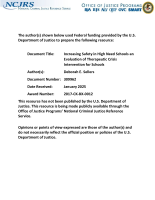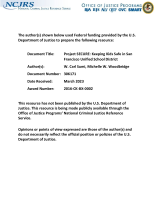Crisis intervention
We Need to Not Fear You: Essential Factors Identified by Sworn Officers and Civilian Staff for Implementation and Expansion of a Co-Response Program
Providing Help to Victims - A Study of Psychological and Material Outcomes, Executive Summary
Providing Help to Victims - A Study of Psychological and Material Outcomes
Mental Health Services in American Jails: A Survey of Innovative Practices
Management of Special Populations: Mentally Disabled Offenders: Final Report
Prosecution of Spouse Abuse - Innovations in Criminal Justice Response
Intervention Development of the Resiliency in Stressful Events (RISE) Curriculum: A Trauma-Informed Reentry Approach for Men
Increasing Safety in High Need Schools: An Evaluation of Therapeutic Crisis Intervention for Schools
Collaborative Strategies in Safeguarding Children: A Community-Centric Approach to Overdose Response
NIJ FY24 Evaluation of BJA Byrne State Crisis Intervention Program (SCIP): Scan of Practices and Evaluability Assessments
How Police Officers Perform in Encounters With the Public Measuring What Matters at the Individual Level
Core Skills for Digital Crisis Intervention: Lessons from a University-Based Online Sexual Assault Hotline
Project SECURE: Keeping Kids Safe in San Francisco Unified School District
Campus Sexual Assault Responses (CSAR): Informing Trauma-Informed Policies, Protocols, and Training
Sexual violence is a significant criminal justice problem with long-term effects for its victims. In particular, sexual assault on or related to college campuses across the United States presents a growing public health and economic burden, starting with significant impacts on academic outcomes.
See the YouTube Terms of Service and Google Privacy Policy
Study Protocol Paper for the Multisite Randomized Controlled Trial of Comprehensive Trauma Informed Reentry Services for Moderate to High-risk Young Males Releasing from State Prisons
AN EXEMPLARY PROJECT - JUVENILE DIVERSION THROUGH FAMILY COUNSELING: A PROGRAM FOR THE DIVERSION OF STATUS OFFENDERS IN SACRAMENTO COUNTY, CALIFORNIA
"It's Hard to Show Empathy in a Text": Developing a Web-based Sexual Assault Hotline in a College Setting
Impact of a School-Based, Multi-Tiered Emotional and Behavioral Health Crisis Intervention on School Safety and Discipline
Preventing Violence and Sexual Assault in Jail: A Situational Crime Prevention Approach
Trauma in Schools - Roundtable Discussion, NIJ Virtual Conference on School Safety
On February 16-18, 2021, the National Institute of Justice hosted the Virtual Conference on School Safety: Bridging Research to Practice to Safeguard Our Schools. This video presents a roundtable discussion from the conference.
See the YouTube Terms of Service and Google Privacy Policy
Addressing Student Mental Health Concerns - Breakout Session, NIJ Virtual Conference on School Safety
On February 16-18, 2021, the National Institute of Justice hosted the Virtual Conference on School Safety: Bridging Research to Practice to Safeguard Our Schools. This video includes the following presentations:
See the YouTube Terms of Service and Google Privacy Policy
Student Mental Health and Trauma - Breakout Session, NIJ Virtual Conference on School Safety
On February 16-18, 2021, the National Institute of Justice hosted the Virtual Conference on School Safety: Bridging Research to Practice to Safeguard Our Schools. This video includes the following presentations:
See the YouTube Terms of Service and Google Privacy Policy




